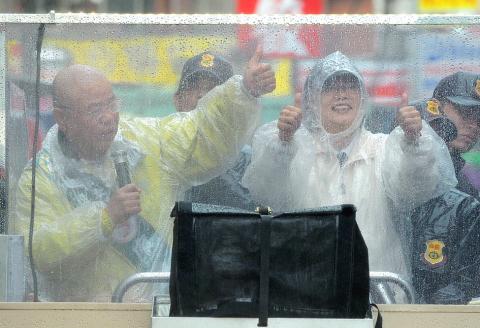Democratic Progressive Party (DPP) presidential candidate Tsai Ing-wen (蔡英文) said in an interview with the New York Times published yesterday that her China policy has been consistent through the years — one that does not accept the “one China” principle and advocates bilateral engagement with a democratic process and under a multilateral framework.
The DPP chairperson said that a “Taiwan consensus,” based on majority opinion through open dialogue, is a better way to deal with China than the opaque -decision-making process used by the Chinese Nationalist Party (KMT) for decades.
The so-called “1992 consensus” has been advocated by President Ma Ying-jeou (馬英九), her opponent in next Saturday’s presidential election, and Beijing because China has insisted on it as a precondition for any cross-strait exchanges.

Photo: Wang Yi-sung, Taipei Times
The 1992 consensus “is messy and nobody has a clear idea or convincing argument as to what happened in the 1990s,” she said.
Tsai said that the Taiwan consensus “means people in Taiwan have to get together and form a consensus of their own and that they would then turn around and talk to the Chinese to form a cross-strait consensus so we can build a relationship on that consensus.”
“And in my view, that is the right order to do things. And with that, we can build a long-lasting relationship with China,” she said.
Taiwan needs to manage uncertainty in dealing with China, a rising power that “is not a democracy or a full market economy yet,” to make sure it could insulate itself from problems such as social instability China may be facing, she said.
Taiwan appears to have lost its sovereignty because more international partners think Taiwan has accepted the “one China” principle and Ma’s interpretation of the cross-strait relationship as an “area-to-area relationship,” Tsai said.
Her China policy has been “pretty consistent” since she served as minister of the Mainland Affairs Council, Tsai said, as she said that Taiwan should leave its options open, but the important decisions have to made by the people through a democratic process.
“I do think we need to normalize our trade and economic relationship [with China] in the multilateral framework of the WTO. That continues to be my position,” she said.
Tsai raised several points about the development of Taiwan’s democracy, saying the bright side is that there are more mature voters and citizens, but there has been increasing Chinese influence as well.
The KMT’s large party assets continued to hurt fair competition between political parties, she added.
She said she was not worried about the US abandoning Taiwan, because Taiwan was not facing China alone and if the US is serious about returning to the Asia-Pacific region, it should boost the confidence of all the countries in the region.
The presidential hopeful said that former president Chen Shui-bian’s (陳水扁) corruption case did not reflect on the DPP, adding that it is the KMT that still has prevalent and systemic corruption.
On economic issues, she highlighted the need for job creation and a change of strategy because Taiwan needs to pursue an employment-driven economy, instead of a GDP-driven one, and change the economy from one based on cost to one based on technology and innovation.

The first two F-16V Bock 70 jets purchased from the US are expected to arrive in Taiwan around Double Ten National Day, which is on Oct. 10, a military source said yesterday. Of the 66 F-16V Block 70 jets purchased from the US, the first completed production in March, the source said, adding that since then three jets have been produced per month. Although there were reports of engine defects, the issue has been resolved, they said. After the jets arrive in Taiwan, they must first pass testing by the air force before they would officially become Taiwan’s property, they said. The air force

GLOBAL: Although Matsu has limited capacity for large numbers of domestic tourists, it would be a great high-end destination for international travelers, an official said Lienchiang County’s (Matsu) unique landscape and Cold War history give it great potential to be marketed as a destination for international travelers, Tourism Administration Director General Chen Yu-hsiu (陳玉秀) said at the weekend. Tourism officials traveled to the outlying island for the Matsu Biennial, an art festival that started on Friday to celebrate Matsu’s culture, history and landscape. Travelers to Matsu, which lies about 190km northwest of Taipei, must fly or take the state-run New Taima passenger ship. However, flights are often canceled during fog season from April to June. Chen spoke about her vision to promote Matsu as a tourist attraction in

The Chinese People’s Liberation Army Navy’s (PLAN) third aircraft carrier, the Fujian, would pose a steep challenge to Taiwan’s ability to defend itself against a full-scale invasion, a defense expert said yesterday. Institute of National Defense and Security Research analyst Chieh Chung (揭仲) made the comment hours after the PLAN confirmed the carrier recently passed through the Taiwan Strait to conduct “scientific research tests and training missions” in the South China Sea. China has two carriers in operation — the Liaoning and the Shandong — with the Fujian undergoing sea trials. Although the PLAN needs time to train the Fujian’s air wing and

PAWSITIVE IMPACT: A shop owner said that while he adopted cats to take care of rodents, they have also attracted younger visitors who also buy his dried goods In Taipei’s Dadaocheng (大稻埕), cats lounging in shops along Dihua Street do more than nap amid the scent of dried seafood. Many have become beloved fixtures who double as photography models, attracting visitors and helping boost sales in one of the capital’s most historic quarters. A recent photo contest featuring more than a dozen shop cats drew more than 2,200 submissions, turning everyday cat-spotting into a friendly competition that attracted amateur and professional photographers. “It’s rare to see cats standing, so when it suddenly did, it felt like a lucky cat,” said Sabrina Hsu (徐淳蔚), who won the NT$10,000 top prize in